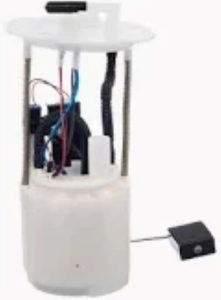The voltage at the fuel pump is a very important parameter that determines performance, as affecting the amount of fuel delivered to the engine. With the majority of fuel pumps being optimally efficient somewhere between 13.5 and 14.5 volts, any decrease in voltage during operation can reduce the pump's output. A 12-volt-drop can equate to as little as a quarter of the pump's peak delivered volume, which means that the fuel will not have enough pressure for ailments such as heapy throttle applications on acceleration or high-load. A fuel pressure drop of just 10% can result in engine knock or misfires, a real problem in high-performance vehicles that require pin-point fuel delivery.
Low Voltage — There are many reasons that can cause low voltage, some examples include: Under sized wiring, poor grounding and/or a power supply which simply cannot provide enough electricity. Ben recommends using a proper wire gauge—probably 12 or 14 AWG—to guarantee the fuel pump will see the right voltage and won't have to overcome dielectric line loss in high-resistance friction fit switch connections. Also, a proper 30- to 40-amp relay allows the pump to get all the voltage it needs and doesn't compromise the performance of high-voltage pumps. Intermittent drops in voltage appear to be a grounding issue and produce fuel pressure variations,causing engine hesitation.

In some racing applications, the major requirement would be that a high-voltage current is necessary to allow consistent fuel delivery. Some tuners fit voltage boosters to the pump so that a constant voltage is supplied, and the pump difference should provide an adequate fuel supply even under heavy load. Kemso high performance fuel pumps are built to withstand the task of using more voltage to top out your vehicle; handling over 400 horse power vehicles while still being dependable. Most of these pumps come with a specification as to what voltage it works best under for peak efficiency.
Voltage too low, the pump work intensity is increased, wearing fast life shorts. Industry data shows failed fuel pumps have an increase of 30% for the first two year on pumps working at low voltage. By running a regular check with a multimeter, you will make sure that your pump is working correctly and remain within its limits so there would be little to no risk of damaging it through higher voltage which could lead to less power or complete failure.
Answering how voltage impacts the performance of a fuel pump the answer has to do with how closely it relates to fuel flow and pressure. Less voltage means less flow and a poorly fuel delivered. This subsequently interrupts not only the power produce by the engine but to some extent, its fuel use as well.
To learn more about high-pressure fuel pumps and how to maximize the delivery of law, see Fuel Pump, where Kemso will offer precise dimensions for this application in a standard or performance manner!
